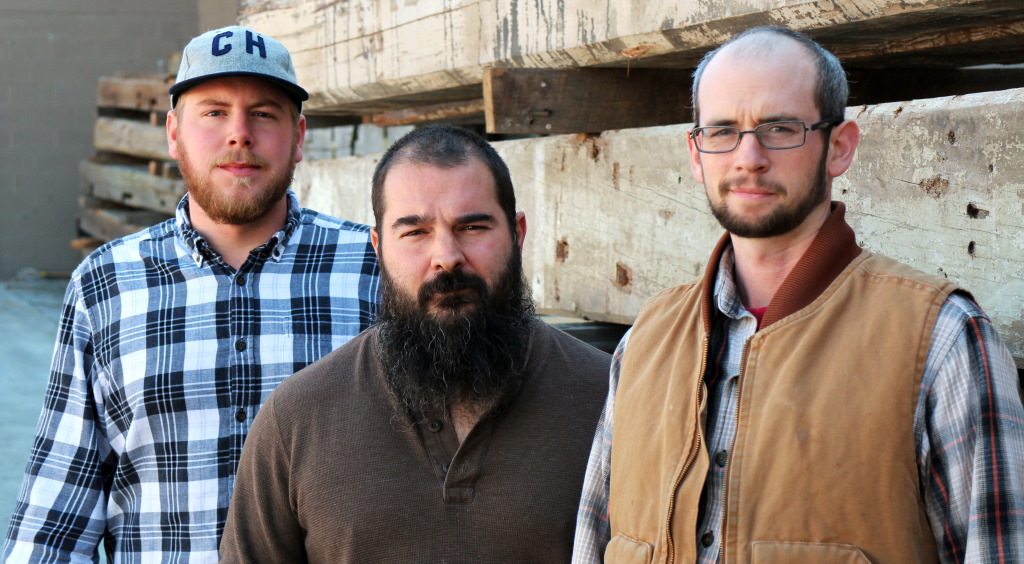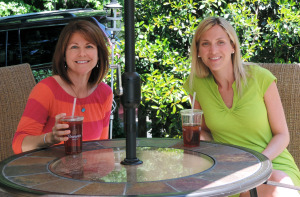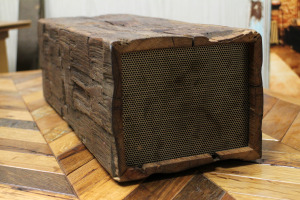
From left: Corey West, Zachary Jester and Tyler Burke of ClawHammer Co., who are raising money online for a speaker system made with reclaimed wood. Photo by Michael Thompson.
For six years Zachary Jester and his six-person company, Van Jester Woodworks, made a living manufacturing high-end wooden tables, doors and shelving.
But when a group of local artisans planned to visit his shop, Jester struggled to find a product that fully represented himself and his skills.
So Jester conjured a design for a 60-watt speaker encased in 100-year-old wood. The BeamBox, as he called it, was born, and the creation was so well-received and personally motivating that Jester thought there was potential for an entire spin-off company called ClawHammer Co.
“You get in the habit of doing business the way you always had been,” Jester said. “The BeamBox was what I wanted to represent and to put out there.”
Funding it was another matter.
Jester eventually decided to take to crowdfunding as way to raise money for The BeamBox and market it at the same time. It’s a choice more and more Richmond entrepreneurs are including in their business plans.
On Kickstarter and Indiegogo, two of the more popular sites for raising funds online, there are 31 active crowdfunding campaigns based in Richmond looking to raise a total of about $1.18 million.
These fund seekers are raising money for things as varied as performance art pieces, album releases and even one request for $200,000 to buy a Lamborghini to make an ex jealous (backers get free rides).
For some businesses, crowdfunding is a last resort. Movie rental shop Video Fan is trying to raise $35,200 on Kickstarter to keep the store from going under.
But it’s becoming more common to find campaigns for startups like ClawHammer. And at least two other local entrepreneurs have decided to take a chance on the generosity of people online to get their ideas off the ground.
Jester has spent about $8,000 to make several prototypes of the BeamBox from the workshop space he subleases from Wellborn + Wright at 3801 Carolina Ave. Now he needs another $8,000 to build up an inventory as he prepares to retail the speakers at $350 apiece.
The speaker will be sold through ClawHammer’s website that will promote other locally made products as well.
“Who knows who built their speaker system?” Jester said. “ClawHammer is about the makers, it’s not just about us selling our products.”
Other local shops selling through ClawHammer include Helm & Craft, Join or Die, Small Axe Forge and Phoenix Handcraft. These independent shops make and sell leather wallets, custom knives, custom fixtures and various goods made from recycled material.
Phoenix Handcraft’s owners also started RVA Makers, the group for which Jester designed The BeamBox.
As of Nov. 16, Jester had raised more than $5,800 of his $8,000 goal since launching a one-month campaign on Kickstarter on Oct. 27. Backers have been promised fire starters, ClawHammer apparel, and BeamBoxes in exchange for donations.
Those raising money through crowdfunding typically offer goods, as opposed to repayment or an ownership stake in the company, to reward backers.
ClawHammer director of marketing Corey West said the Kickstarter campaign for The BeamBox has struggled to drum up funding after an initial burst of support from family and friends.
“It almost provides a false sense of confidence because what happens when that well dries up?” West said.
If ClawHammer doesn’t reach its goal in time, it won’t get any of the money already pledged. That’s one of the risks entrepreneurs take in using a Kickstarter campaign.

Marilyn Collins (left) and Michelle Logan created a product designed to make sleeping easier for mastectomy patients and are raising money online. Photo courtesy of Marilyn & Michelle.
The chance of not getting any funding at all is what made Richmonders Michelle Logan and Marilyn Collins decide to do a campaign on Indiegogo for their new product, the TaTa Topper. Their company, Marilyn & Michelle, is a product of the friends’ shared experience undergoing double mastectomies.
The TaTa Topper is a sleeping pad designed for women dealing with pain from mastectomy surgery. The pads have a space cut out where a woman’s chest would be if she were lying on her stomach and comes with inserts to adjust the amount of space available. Logan said they also see a market for the product with mothers who are nursing.
Both Kickstarter and Indiegogo charge fees to host crowdfunding campaigns. Indiegogo gives users the option to take on higher fees in exchange for immediate access to their funding as the money is donated.
With money of their own already invested, Logan and Collins set a goal to raise $20,000 for the TaTa Topper.
“We’ve invested $10,000 of our own money so far,” Logan said. “We decided to do crowdfunding because it’s a community product.”
They’ve raised about $6,000 since Nov. 5, and they’ve used the money to order 200 pads set to go on the shelves of Stepping Stones Women’s Center in Mechanicsville and to be sold online. The pads are made in Ashland and come with sheets sewn in Lebanon, Va. They retail for $150.
Bumper stickers, a recipe collection, care packages for nursing moms or mastectomy patients, a TaTa Topper and dinner with Logan and Collins are up for grabs in exchange for funding. The campaign ends Dec. 3.
Another local entrepreneur, Bryan Wright, recently reached his crowdfunding goal for his new product. Wright created the Pivot Calendar, a patent-pending self-adhesive, dry-erase wall calendar and raised $10,211 on Kickstarter. His goal was $10,000.
Wright has already invested $5,000 to get a provisional patent for the Pivot Calendar, and he expects to spend another $5,000 in the next phase of the patent process. The calendars are made in New York and will retail for $45. Wright said he’ll use his Kickstarter money to build up his inventory and go to trade shows.

The reusable Pivot Calendar that sticks to the wall raised more than $10,000 online. Photo courtesy of Bryan Wright.
In hindsight, Wright said it would have been better to get as many people to commit to ordering his product as possible before launching his campaign. That way when the campaign went online, the large burst of initial orders would catch the notice of the official Kickstarter website and his campaign would show up higher in search results, he said.
“What I found with Kickstarter is that I really didn’t know you really needed to do a bunch of selling before you launch,” Wright said. “If you don’t do that, it’s only people that you tell to go there that will. You won’t get any strangers to your site.”
Not every crowdfunding campaign has the success that Wright had.
Logan of Marilyn & Michelle said her company’s backup plan is to rely on the money she and her partner have already invested in the company as well as sales revenue that’s been trickling in.
“We’ll still produce the money ourselves,” Logan said. “It will just take a little more time.”
For Jester of Clawhammer, a failed Kickstarter campaign would be redeemed by the amount of attention the campaign creates for the company.
“It’s something to build a marketing campaign around,” Jester said. “The essence of it is ‘Let’s get out there and talk about it and get people excited.’”

From left: Corey West, Zachary Jester and Tyler Burke of ClawHammer Co., who are raising money online for a speaker system made with reclaimed wood. Photo by Michael Thompson.
For six years Zachary Jester and his six-person company, Van Jester Woodworks, made a living manufacturing high-end wooden tables, doors and shelving.
But when a group of local artisans planned to visit his shop, Jester struggled to find a product that fully represented himself and his skills.
So Jester conjured a design for a 60-watt speaker encased in 100-year-old wood. The BeamBox, as he called it, was born, and the creation was so well-received and personally motivating that Jester thought there was potential for an entire spin-off company called ClawHammer Co.
“You get in the habit of doing business the way you always had been,” Jester said. “The BeamBox was what I wanted to represent and to put out there.”
Funding it was another matter.
Jester eventually decided to take to crowdfunding as way to raise money for The BeamBox and market it at the same time. It’s a choice more and more Richmond entrepreneurs are including in their business plans.
On Kickstarter and Indiegogo, two of the more popular sites for raising funds online, there are 31 active crowdfunding campaigns based in Richmond looking to raise a total of about $1.18 million.
These fund seekers are raising money for things as varied as performance art pieces, album releases and even one request for $200,000 to buy a Lamborghini to make an ex jealous (backers get free rides).
For some businesses, crowdfunding is a last resort. Movie rental shop Video Fan is trying to raise $35,200 on Kickstarter to keep the store from going under.
But it’s becoming more common to find campaigns for startups like ClawHammer. And at least two other local entrepreneurs have decided to take a chance on the generosity of people online to get their ideas off the ground.
Jester has spent about $8,000 to make several prototypes of the BeamBox from the workshop space he subleases from Wellborn + Wright at 3801 Carolina Ave. Now he needs another $8,000 to build up an inventory as he prepares to retail the speakers at $350 apiece.
The speaker will be sold through ClawHammer’s website that will promote other locally made products as well.
“Who knows who built their speaker system?” Jester said. “ClawHammer is about the makers, it’s not just about us selling our products.”
Other local shops selling through ClawHammer include Helm & Craft, Join or Die, Small Axe Forge and Phoenix Handcraft. These independent shops make and sell leather wallets, custom knives, custom fixtures and various goods made from recycled material.
Phoenix Handcraft’s owners also started RVA Makers, the group for which Jester designed The BeamBox.
As of Nov. 16, Jester had raised more than $5,800 of his $8,000 goal since launching a one-month campaign on Kickstarter on Oct. 27. Backers have been promised fire starters, ClawHammer apparel, and BeamBoxes in exchange for donations.
Those raising money through crowdfunding typically offer goods, as opposed to repayment or an ownership stake in the company, to reward backers.
ClawHammer director of marketing Corey West said the Kickstarter campaign for The BeamBox has struggled to drum up funding after an initial burst of support from family and friends.
“It almost provides a false sense of confidence because what happens when that well dries up?” West said.
If ClawHammer doesn’t reach its goal in time, it won’t get any of the money already pledged. That’s one of the risks entrepreneurs take in using a Kickstarter campaign.

Marilyn Collins (left) and Michelle Logan created a product designed to make sleeping easier for mastectomy patients and are raising money online. Photo courtesy of Marilyn & Michelle.
The chance of not getting any funding at all is what made Richmonders Michelle Logan and Marilyn Collins decide to do a campaign on Indiegogo for their new product, the TaTa Topper. Their company, Marilyn & Michelle, is a product of the friends’ shared experience undergoing double mastectomies.
The TaTa Topper is a sleeping pad designed for women dealing with pain from mastectomy surgery. The pads have a space cut out where a woman’s chest would be if she were lying on her stomach and comes with inserts to adjust the amount of space available. Logan said they also see a market for the product with mothers who are nursing.
Both Kickstarter and Indiegogo charge fees to host crowdfunding campaigns. Indiegogo gives users the option to take on higher fees in exchange for immediate access to their funding as the money is donated.
With money of their own already invested, Logan and Collins set a goal to raise $20,000 for the TaTa Topper.
“We’ve invested $10,000 of our own money so far,” Logan said. “We decided to do crowdfunding because it’s a community product.”
They’ve raised about $6,000 since Nov. 5, and they’ve used the money to order 200 pads set to go on the shelves of Stepping Stones Women’s Center in Mechanicsville and to be sold online. The pads are made in Ashland and come with sheets sewn in Lebanon, Va. They retail for $150.
Bumper stickers, a recipe collection, care packages for nursing moms or mastectomy patients, a TaTa Topper and dinner with Logan and Collins are up for grabs in exchange for funding. The campaign ends Dec. 3.
Another local entrepreneur, Bryan Wright, recently reached his crowdfunding goal for his new product. Wright created the Pivot Calendar, a patent-pending self-adhesive, dry-erase wall calendar and raised $10,211 on Kickstarter. His goal was $10,000.
Wright has already invested $5,000 to get a provisional patent for the Pivot Calendar, and he expects to spend another $5,000 in the next phase of the patent process. The calendars are made in New York and will retail for $45. Wright said he’ll use his Kickstarter money to build up his inventory and go to trade shows.

The reusable Pivot Calendar that sticks to the wall raised more than $10,000 online. Photo courtesy of Bryan Wright.
In hindsight, Wright said it would have been better to get as many people to commit to ordering his product as possible before launching his campaign. That way when the campaign went online, the large burst of initial orders would catch the notice of the official Kickstarter website and his campaign would show up higher in search results, he said.
“What I found with Kickstarter is that I really didn’t know you really needed to do a bunch of selling before you launch,” Wright said. “If you don’t do that, it’s only people that you tell to go there that will. You won’t get any strangers to your site.”
Not every crowdfunding campaign has the success that Wright had.
Logan of Marilyn & Michelle said her company’s backup plan is to rely on the money she and her partner have already invested in the company as well as sales revenue that’s been trickling in.
“We’ll still produce the money ourselves,” Logan said. “It will just take a little more time.”
For Jester of Clawhammer, a failed Kickstarter campaign would be redeemed by the amount of attention the campaign creates for the company.
“It’s something to build a marketing campaign around,” Jester said. “The essence of it is ‘Let’s get out there and talk about it and get people excited.’”

NYT and WSJ once did this kind of reporting every day. This is serious, useful business journalism. Multi-sourced, detailed and in context to the larger markets outside of Richmond. Talks about mistakes made, risks, failure as well as success.